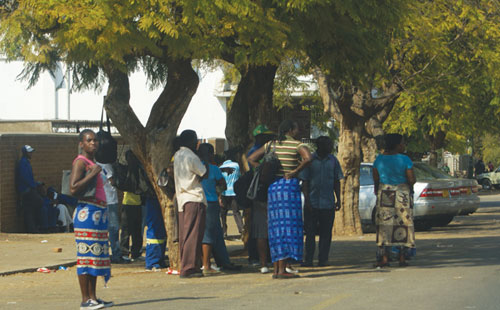
It is a hustle and bustle everyday along 4th Avenue and Robert Mugabe Way in Bulawayo.
Gamma Mudarikiri Own Correspondent
Men and women of all ages spend most of the day running after vehicles that stop or pass along this busy street in search of menial jobs. It is an ironic reminder of colonial Rhodesia where whites used to drive around the city streets cherry-picking “house-girls” and “garden-boys”.
Maketo Makanyika (38), a single mother who lost her husband 10 years ago, has been patronising the place for the past months in desperate attempts to land any casual job so that she is able to put food on the table for her eight siblings.
Three of her children are of school going age, but she cannot afford the fees and all have dropped out of school. Like hordes of other employed residents, Makanyika makes a daily pilgrim age to 4th Avenue in the hope of securing a “piece” job.
“I come here every day at 6am hoping to get any job to do so I can put food on the table for my family,” Makanyika said. “There are many of us here competing for the jobs and on most of the days I go back home with nothing,” she added.
Occasionally motorists stop by seeking house cleaners, washers, nannies and gardeners. Violet Moyo, another single mother, said she has been on the street searching for menial jobs for years to survive. Moyo at one time spent more than a year without securing a menial job, but she never quit coming to 4th Avenue.
Elijah Ncube (71) also wakes up every day to his now permanent space along 4th and Robert Mugabe Way to compete for the few menial jobs with the youngsters who could be her grand children.
- Chamisa under fire over US$120K donation
- Mavhunga puts DeMbare into Chibuku quarterfinals
- Pension funds bet on Cabora Bassa oilfields
- Councils defy govt fire tender directive
Keep Reading
“I have four of my grandchildren. I cannot just seat at home. How will I feed them?” Ncube asked. Jimson Mahamba (21) dropped out of high school five years ago after his parents failed to pay his fees. For the past five years he has known no other place than 4th Avenue and Robert Mugabe Way. “Life is not easy here on the street” Mahamba said. “For the past two months I only had one piece job to push a car and was paid a $1,” he adds.
Mahamba said he lives on the streets as he cannot afford paying for decent accommodation. Chances of formal employment for Mahamba and other patrons of 4th Avenue are limited as industry in Bulawayo is at its knees.
Last year alone 84 companies closed down in the city which was once the industrial hub of Zimbabwe and 64 are reportedly on the verge of collapse.
But questions abound whether President Robert Mugabe, whose Zanu PF romped to victory in the just-ended elections, would be able to create employment for the multitudes of citizens eking out a living in the streets with unemployment nationally estimated at above 80%.
Zanu PF has dangled promises of creating 2,265 million jobs across the 14 sectors of the economy as a direct result of unlocking resources from indigenisation and empowerment assets.
But critics doubt that 4th Avenue will disappear from the radar with the re-election of Mugabe, citing Zanu PF’s failed policies in the past 33 years. John Robertson, an economic analyst, said Zanu PF’s promise of creating creating more than two million jobs in the next five years could have been a mere campaign gimmick, adding that people would continue scavenging in the streets unless and until the new government got its priorities right.
Robertson pointed out that the government already had a bloated workforce constituting three quarters of the employed population in Zimbabwe. He said the current business environment was not even feasible for the private sector to strive and create jobs, adding that the indigenisation law was scaring away potential investors.
“Creating over two million jobs is not feasible in a government which is failing to attract investment,” Robertson said. “Those jobs can only be created by a thriving private sector which is not the case largely due to policy misalignment,” he added.
Robertson said the labour laws were restricting the creation of the targeted jobs and they should be amended for the new government to achieve the set goals. Zanu PF said it expects to raise $29, 2 billion over the next five years by unlocking value from indigenised firms.
This is expected to be achieved by indigenising 1 138 companies valued at $14,3 billion and unlocking value for empowerment and development by leveraging $1, 8 trillion in mineral reserves, $7,6 billion in idle assets held by parastatals and $1,3 billion assets held by local authorities.
But Robertson however challenged the idea saying it was not possible to raise the $29, 2 billion within the specified period. “The acquisition of shares its not the acquisition of money to sustain the economy,” Robertson said.
Eric Bloch, an economic commentator based in Bulawayo, said the creation of the over two million jobs was possible although this was dependent on the new government modifying the indigenisation law to attract foreign direct investment. “Creating the two million jobs is possible if the right policies are implemented,” Bloch said. Only time will tell if the new government will take the unemployed multitudes out of 4th Avenue and other streets of Zimbabwe.










